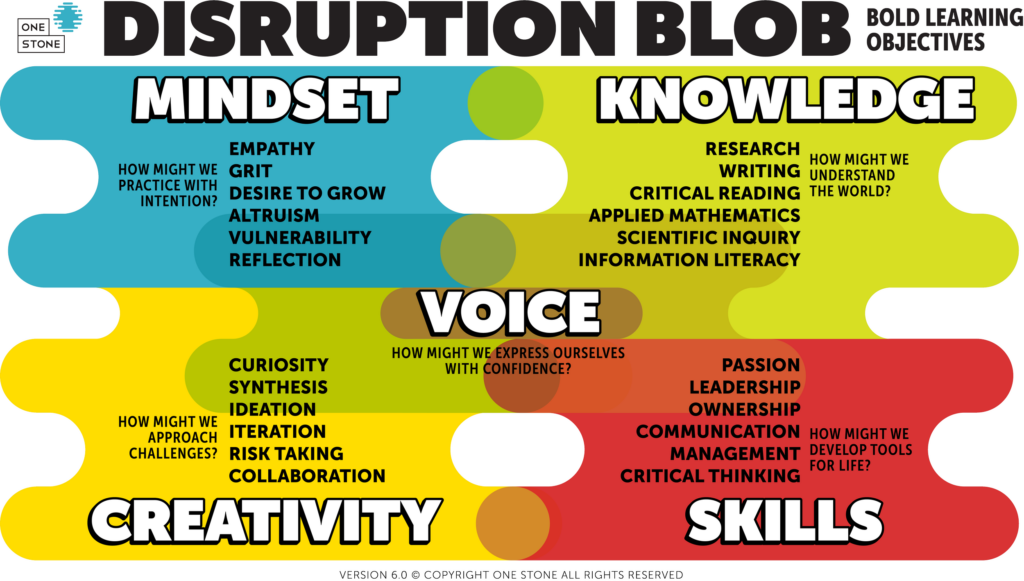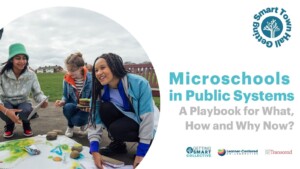Beyond the Grade: How One Stone’s Growth Framework Empowers Learners for Life
Key Points
-
The Growth Framework shifts focus from traditional grading to fostering skills like empathy, leadership, and self-awareness, preparing students for real-world challenges.
-
Implementing such frameworks requires a collaborative effort, readiness for change, and a focus on holistic student development, as demonstrated by Insight Colearning’s adoption.

By: Celeste Bolin, Susan Haws, Sophie Gunther, Lauren Mansfield, Raya Naymik
As microschools around the world take up the challenge of designing and delivering educational experiences that meet the needs of 21st-century learners, they are inevitably considering not only what they teach, but also why and how. While each microschool is unique, common themes emerge. Generally, the what refers to a more hands-on, relationship-based, and learner-centered experience, distinct from traditional task-based, standardized curricula. The why is to ensure that graduates know and can leverage their strengths, interests, and passions to make a positive impact, become effective community builders, and adapt as lifelong learners in a rapidly changing world. Typically, the how involves a coherent yet dynamic program that offers voice and choice, appropriate levels of challenge, authentic work, and timely, actionable feedback.
Importantly, microschools must also be able to report to students, families, and external stakeholders the extent to which both learner and school goals have been achieved. This what, why, and how are often summarized in a “portrait of a graduate.”
One Stone’s Growth Framework was developed alongside the launch of its lab school in 2016, and since 2022, it has been implemented in nine partner schools across the nation. The Growth Framework offers a comprehensive and timely portrait of a graduate. Grounded in research on positive youth development, the science of learning, and 21st-century workplace skills, the framework defines 24 Bold Learning Objectives (referred to as “the BLOB” or “BLOBs”) that learners cultivate throughout their high school experience.
As students engage in One Stone’s applied, real-world learning experiences, they receive one-on-one mentoring and coaching to help them set personal goals and develop their agency with increasing sophistication. Their progress is tracked using a tool that collects assessment data and displays learners’ real-time proficiency in the 24 Bold Learning Objectives.
Rather than relying on teacher-driven assignments and a traditional, 100-point grading scale—which often obscures the complex and multifaceted nature of learning—students are empowered to focus on specific, yet complex, skills. They receive substantive feedback from multiple evaluators, including peers, mentors, and themselves.
Disseminating Innovation
We know that sharing successful educational innovations is key to making the most of our resources and ensuring new programs and technologies have the biggest possible impact. Key concepts from Diffusion of Innovations Theory and the field of implementation science highlight the importance of innovation characteristics, communication channels, organizational conditions, and the technical skills required to support the effective dissemination of new ideas.
Moreover, we now recognize the value of addressing the significant challenges associated with dissemination in education—especially when compared to the alternatives of clinging to outdated practices or allowing each organization to develop its own fragmented systems. In short, creating high-impact, learner-centered strategies and systems that can be effectively disseminated and adapted across diverse settings holds the potential to disrupt the status quo and provide a roadmap for others striving to prepare learners for the challenges of the 21st century.
Taking into consideration their shared values and the potential benefits of dissemination, Insight Colearning (Durham, NC) adopted One Stone’s Growth Framework in 2022. The adoption process involved multiple conversations about educational values, school culture, program elements, and current assessment practices in each school. Insight weighed the extent to which adopting the BLOB would change, enhance, or diminish the existing portrait of a graduate. One Stone considered Insight’s capacity for partnership and readiness for implementation.
Since Insight adopted the Growth Framework, students and educators alike have been experiencing the shift from course-specific, teacher-made mastery rubrics to a more holistic, learner-centered approach. Now in its third year of implementation, the Growth Framework—affectionately known as “the BLOB”—is helping students better understand their learning journeys and develop skills that go far beyond discrete classroom experiences.
The Power of the Growth Framework
We recently asked students from both One Stone and Insight Colearning to share their thoughts on the power and challenges of utilizing the Growth Framework. Here are three key takeaways from their reflections, with insights from Lauren Mansfield (Class of 2026, Insight Colearning), Raya Naymik (Class of 2025, One Stone lab school), and Sophie Gunther (Class of 2026, One Stone lab school).
Supports Holistic and Authentic Growth: The Growth Framework helps students grow not only academically, but also in areas like empathy, communication, and leadership—skills that don’t often appear on traditional transcripts. Raya describes that “It’s not so black and white—you can identify growth in communication, empathy, and synthesis through one experience.”
Promotes Self-Awareness and Intrinsic Motivation: Rather than relying on grades or percentages for validation, students are encouraged to reflect on their own effort, growth, and learning process. Sophie explains that “It forces you to think ‘how do I feel about how I performed and the effort I put in,’ rather than that confidence coming from a letter or number.”
Encourages Meaningful, Multi-Disciplinary Learning: The framework offers a flexible, transparent system that supports cross-disciplinary learning and makes grading more consistent and relevant. Lauren states that “Students can apply what they’ve learned to multiple classes and have their transcript reflect that.” Raya adds that “It provides a structure to develop well-rounded learning experiences and help students drive their learning” and Sophie offers that “On a personal level, it pushes you to look into the process of how and why you do work and learn.”
The Challenges of the Growth Framework
These same students have also identified some real challenges in using this sort of competency-based assessment, based on individualized, real-world skills. They identified that it can feel like there are assessment limitations or inconsistencies. Raya remarked that it can be “Hard to get assessed in every objective enough times” to see growth on a timeline you are ready for. Also, it can present motivation and engagement challenges. Lauren noted that sometimes “Students are not enthusiastic about reflecting” and Sophie added that “The Growth Framework is most effective for highly motivated students…sometimes it feels like I need to wait for others.”
Despite these challenges, students are clearly able to articulate the power of the BLOB and Growth Framework for setting goals for growth in areas like collaboration and risk taking. They also emphasize the importance of advisors in this process and how they use the BLOB to help them grow.
Fosters Meaningful Academic Conversations and Reflection: Students see the BLOB as a key tool that encourages vulnerability, goal-setting, and ongoing reflection, especially in mentor and coach relationships. Sophie explained that “The BLOB is a great outlet for meaningful conversation and soul searching. It starts conversations about risk taking, passion, grit, and more.”
Demonstrates Accountability and Identifies Areas for Support: Students highlight how the growth transcript linked to the BLOB gives students a snapshot of where they are and helps signal when extra help or flexibility is needed.
Lauren summarizes all this eloquently, “The multifaceted nature of the Growth Framework allows students to use the skills they have learned in one class and use those skills in a completely different class. Students can show Desire to Grow in math and outdoor learning, causing the Growth Framework to reflect their growth in all subjects as a whole instead of many different grades combined into a GPA. This motivates students to put extra effort into their projects and assignments, as opposed to only doing the bare minimum to get a 100% without learning how to challenge themselves. At my old school, I was just turning in a paragraph that technically met all of the requirements to get a 100%. With the Growth Framework, my writing has improved a ton because I actually try and now I enjoy writing essays because I want to push myself to do my best.“
In Conclusion
Through early partnerships with nine schools, One Stone has identified key facilitators and barriers to the successful adoption and implementation of the Growth Framework. As a partner, Insight Colearning has recognized the shifts—sometimes subtle—in framing, language, pedagogical practice, student and teacher training, and stakeholder communication that are necessary to fully implement a new portrait of a graduate. The most important lessons have emerged from our close collaboration with students—the ultimate stakeholders in their educational experience. Feedback from both current students and graduates reveals that a holistic, learner-centered framework serves them well, not only during high school but also into young adulthood.
Putting students in the driver’s seat of their own growth—and equipping them with the tools to track and reflect on their progress—is one of the most powerful forms of empowerment we can offer. As Sophie puts it, the Growth Framework creates “less pressure to get a high percentage and grade. It forces you to think, ‘How do I feel about how I performed and the effort I put in?’ rather than that confidence or validation coming from a letter or number.”
By shifting the focus from external validation to internal reflection, the Growth Framework not only supports academic development but also fosters self-awareness, agency, and resilience. It’s more than a system for school—it’s a toolkit for lifelong learning.
Celeste Bolin, Executive Director, One Stone
Susan Haws, Executive Director, Insight Colearning
Sophie Gunther, Class of 2026, One Stone Lab School
Lauren Mansfield, Class of 2026, Insight Colearning
Raya Naymik, Class of 2025, One Stone Lab School





0 Comments
Leave a Comment
Your email address will not be published. All fields are required.